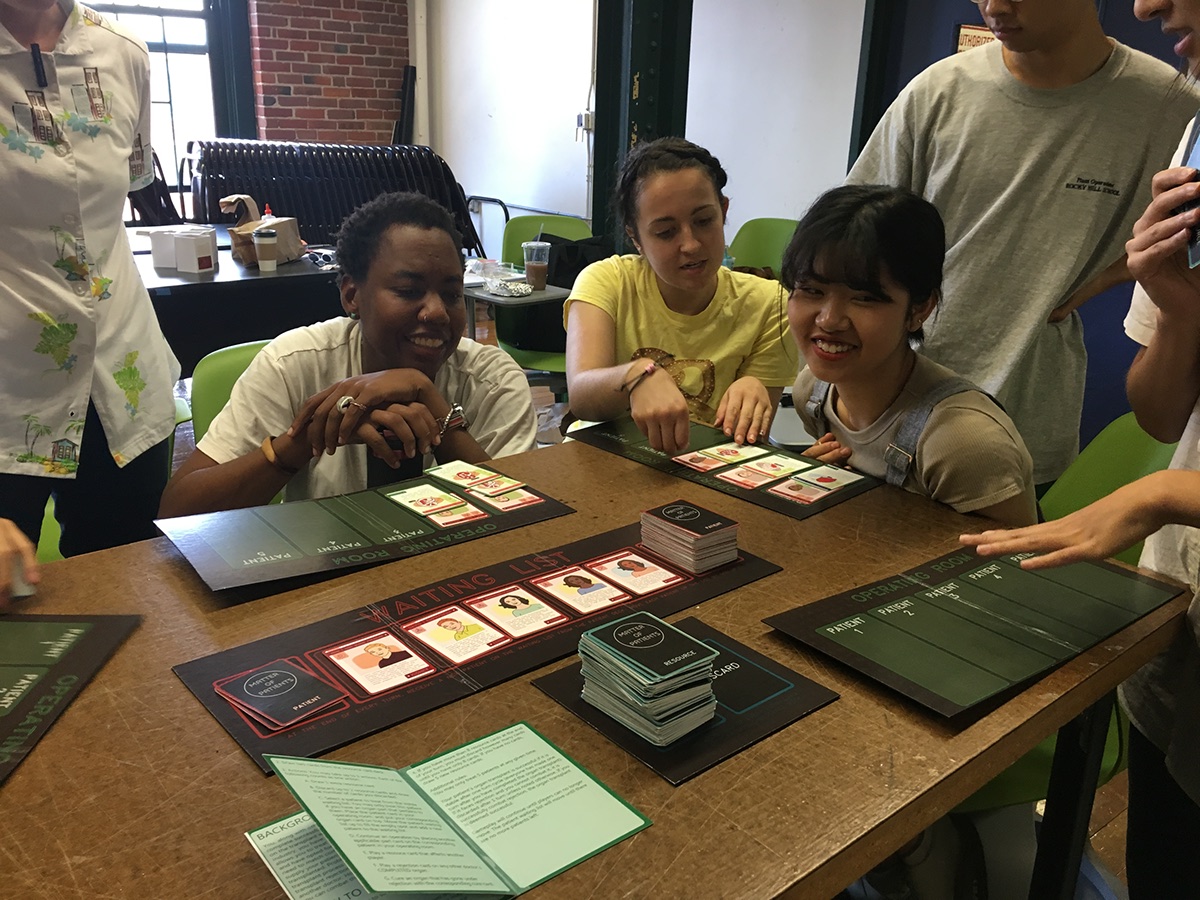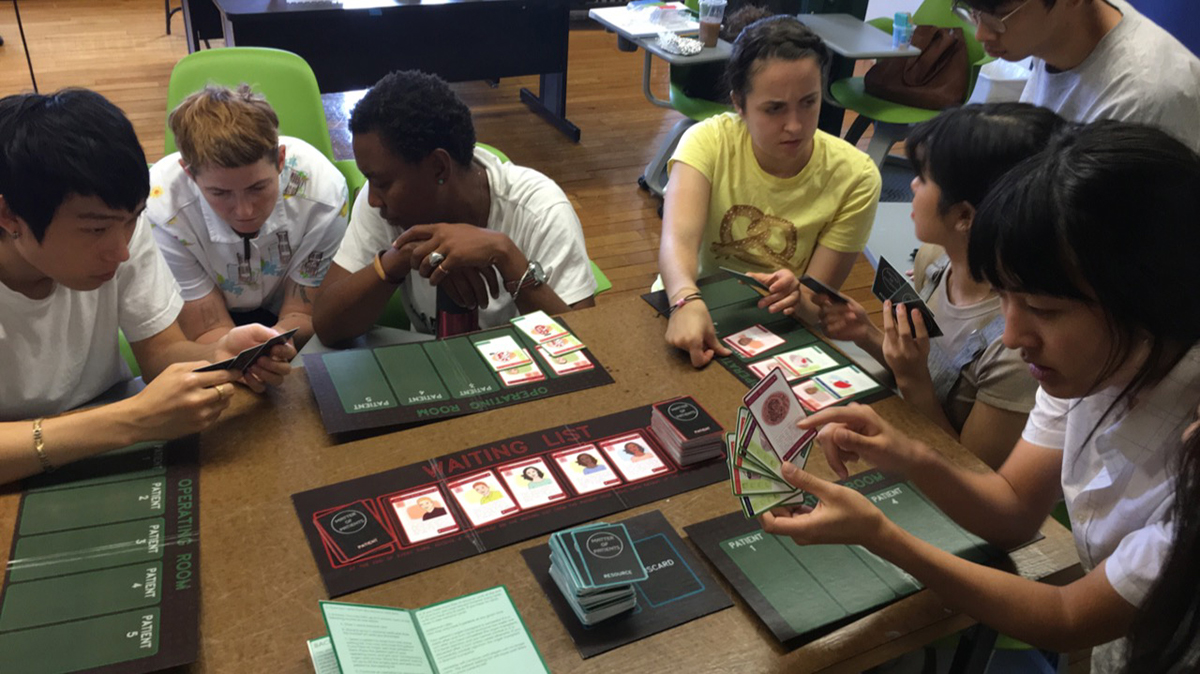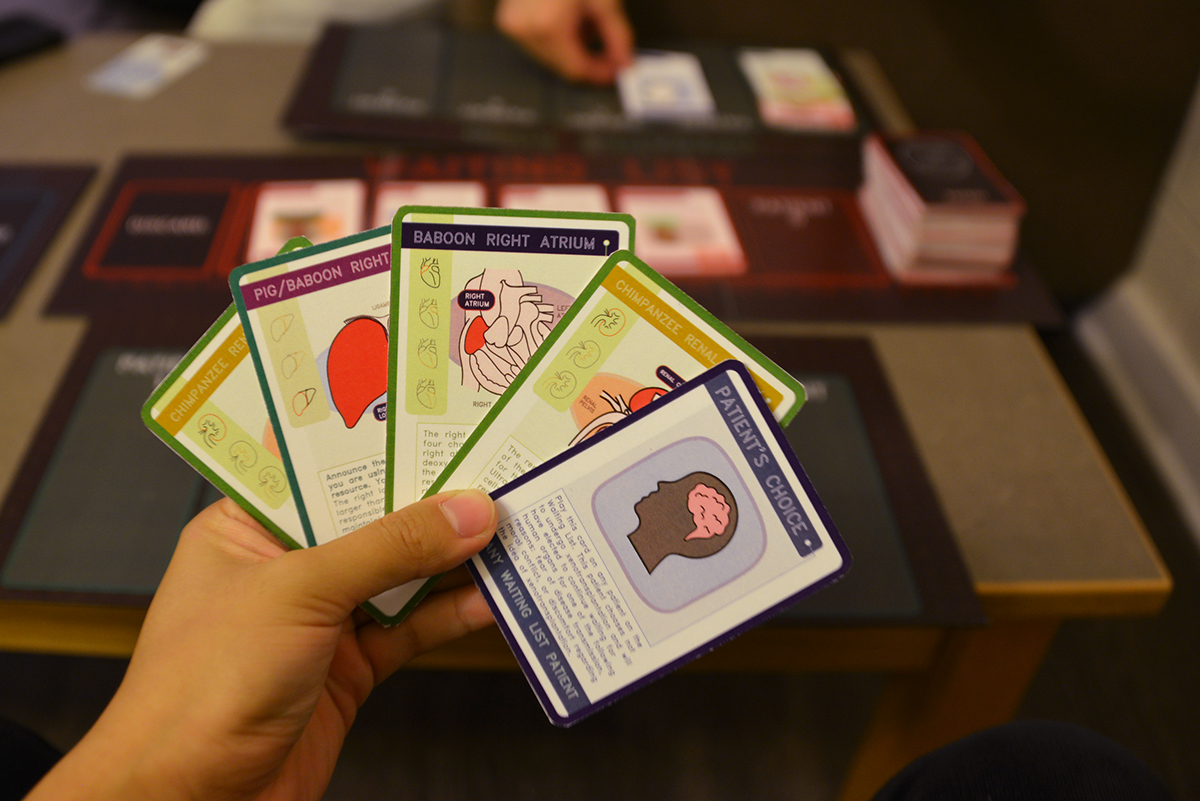Designing for Play, Fall 2017, Instructor: Cas Holman
Matter of Patients
An interactive card game designed for 2-4 players (ages 8+) as a playful way to learn about organ transplantation.

Prompt | Timeline: 4 Weeks
Design a playful way to learn anatomy.
Process
I started by identifying types of play that help facilitate learning. I decided to design a card game that would encompass these play types.
Types of play that facilitate learning:
-Communicative Play
- Social/Group Play
- Object Play
- Mastery Play
- Competitive Play
- Role Play

In my research about anatomy, I learned more about xenotransplantation, the process of using animal organs to treat patients needing organ transplants. Using animal parts as a metaphor for human anatomy serves as a learning tool - learning about anatomy in a strange or fun context could increase learning retention. I also wanted to simulate the reality of organ transplant patients, as on average, twenty people die every day waiting for a transplant.
To figure out the rules, gameplay, and card distribution, I conducted a series of play tests, playing both with myself and other groups of users.





Gameplay
Each player acts as a doctor, racing against their fellow doctor(s) to complete successful organ transplants for patients on the transplant waiting list. As pioneers in the industry, they have realized that using animal organs allows them to treat patients at a much faster rate and have opted for xenotransplantation. To win the game, players compete to be the first doctor to complete three successful transplants. They will need to match correct organ parts in order to supply their patients with an organ that can be transplanted. Problems will arise during the transplant process - patients may have to fight transplant rejection or switch hospitals to work with another doctor. However, with the right resources, players can combat these problems.

Types of Cards:
Below are select examples of each card type.
Patient Cards - Identifies an individual in need of a transplant due to a condition or disease:
















Organ Part Cards - Identifies the animal and part type that is needed to complete an organ for transplant. Shows where the part is located in the organ, as well as how many and which parts are necessary to complete the organ set:
















Rejection and Medication Cards - Explains the type of rejection as well as possible cures doctors can use to combat rejection:








Additional Factors Cards - Includes problems or preemptive measures that doctors can face and take in the real world.






Card Breakdown:
72 Patient Cards:
12 Pancreas Transplant Patients
12 Kidney Transplant Patients
12 Liver Transplant Patients
12 LungTransplant Patients
6 Heart/Lung Transplant Patients
6 Heart/Liver Transplant Patients
87 Organ Part Cards:
3 Pig Heart Transplant Card Sets (Right Atrium, Left Atrium, Right Ventricle, Left Ventricle)
3 Baboon Heart Transplant Card Sets
2 Pig/Baboon Heart Transplant Card Sets
2 Pig Lung Transplant Card Sets (Alveoli, Bronchi/Bronchioles, Pleura)
2 Baboon Lung Transplant Card Sets
1 Pig/Baboon Lung Transplant Card Set
2 Pig Liver Transplant Card Sets (Right Lobe, Left Lobe, Ligaments)
2 Baboon Liver Transplant Card Sets
1Pig/Baboon Liver Transplant Card Set
2 Pig Pancreas Islet Transplant Card Sets (2 Islet Transfusions)
2 Tilapia Pancreas Islet Transplant Card Sets
1 Pig/Tilapia Pancreas Islet Transplant Card Set
2 Pig Kidney Transplant Card Sets (Renal Cortex, Renal Medulla, Renal Pelvis)
2 Chimpanzee Kidney Transplant Card Sets
1 Pig/Chimpanzee Kidney Transplant Card Set
14 Rejection Cards:
2 Hyperacute Pancreas/Lung Transplant Cards
2 Hyperacute Kidney/Heart Transplant Cards
8 Acute Rejection Cards
2 Chronic Rejection Cards
8 Medicine Cards:
8 Immunosuppressive Therapy Cards
23 Additional Factors Cards:
6 Doctor's Orders Cards
6 Gene Therapy Cards
4 Patient's Choice Cards
3 Patient Transfers Hospital Cards
2 P.E.T.A Protest Cards
2 State Legislation Cards

Above: Players playing in teams of three.



